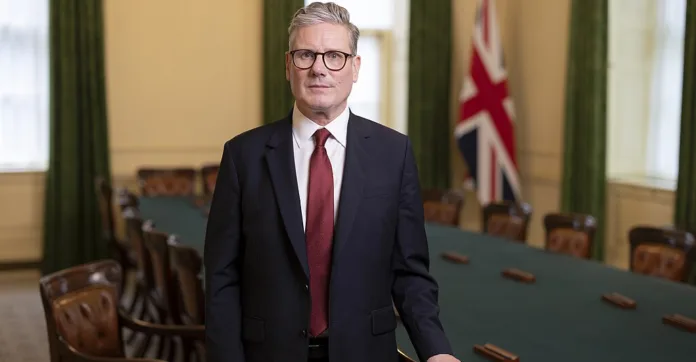Labour leader blames Brexit for surge in net migration, as latest figures show nearly one million people moved to the UK in the past year
Labour leader Sir Keir Starmer has strongly criticised the government’s handling of immigration in the wake of newly released figures revealing that net migration to the UK reached a record high of nearly one million people last year. Starmer accused the Conservative government of turning Britain into an “open borders experiment” by failing to properly control migration after Brexit.
The official data, published recently, shows that the UK saw an influx of nearly one million people in the past year, a figure that has raised concerns across the political spectrum. With many pointing to the significant rise in the number of workers, students, and asylum seekers entering the country, the issue of migration has become one of the most hotly debated topics in British politics.
Starmer seized on the data, claiming that the government’s Brexit policies had inadvertently opened the door to a surge in migration, exacerbating the pressure on public services and housing. He argued that the Tories, in their pursuit of a post-Brexit future, had created an environment where borders were far less controlled than they were before the UK left the European Union.
Embed from Getty Images“Brexit has turned Britain into an open borders experiment,” Starmer declared. “The government promised that we would regain control of our borders, but what we’re seeing is a complete failure of that promise. The current system is chaotic and unmanageable, and it’s the people of Britain who are paying the price.”
The Labour leader’s comments come amid rising tensions within the Conservative Party over how to handle the increasing numbers of migrants. While some members call for stricter border controls and a return to pre-Brexit immigration policies, others argue that migration is essential for the UK’s economy, particularly post-pandemic.
Starmer’s criticism also underscores the wider political divide over how the country should approach immigration and its relationship with the EU. As Labour seeks to distance itself from the Tories’ approach, Starmer has vowed to introduce a fairer immigration system that prioritises skills and needs, while addressing the growing challenges faced by local communities.
In response, the government defended its position, arguing that the rise in migration was largely due to factors beyond the UK’s control, such as global economic pressures and the war in Ukraine. A spokesperson for the Home Office pointed out that the UK was not alone in experiencing higher migration levels, with many other European countries also seeing similar trends.
However, critics argue that the government’s post-Brexit immigration system has created gaps in border security, allowing for an influx of migrants that was not properly anticipated when the UK left the EU. They claim that the current system is not equipped to manage the complexities of modern migration, leaving communities vulnerable and stretched.
Starmer’s comments are likely to intensify the debate ahead of the upcoming general election, with migration set to be a key issue in voters’ minds. As both major political parties continue to offer differing views on how to address the challenges of migration, it remains to be seen which approach will resonate with the public.
BBC
Net migration to the UK hit a record high of 906,000 for the year to June 2023, significantly surpassing previous estimates. The Office for National Statistics (ONS) revised its original estimate of 740,000 upwards by 166,000. While net migration has since fallen to 728,000 in the year to June 2024, the figures remain a key talking point in political debates.
Labour leader Sir Keir Starmer used the revised figures to criticise the Conservative government, accusing them of conducting an “open borders experiment” that led to unsustainable levels of migration. He described the increase in net migration as “off the scale.”
In response, Prime Minister Rishi Sunak promised new immigration laws aimed at reducing migration, with details expected soon. Conservative shadow home secretary Chris Philp rejected Starmer’s accusations, dismissing the claim of an open borders policy and questioning Labour’s credibility on immigration matters, claiming their proposals lacked substance. The debate over immigration continues to dominate UK political discourse, with both parties positioning themselves ahead of potential reforms.
INDEPENDENT
Sir Keir Starmer has accused the Conservative government of using Brexit as a “one-nation experiment in open borders” following the revelation that over 900,000 people entered the UK in 2023, setting a new record for net migration. Starmer claimed that the Tories had betrayed Brexit voters, who were promised reduced immigration as a key outcome of leaving the EU. Instead, the figures show an increase in immigration, which Starmer argues is the result of the government’s deliberate policy choices.
In response, Prime Minister Rishi Sunak acknowledged the figures as “shocking” and vowed to reduce immigration numbers through “hard graft” and stricter business regulations. He also defended the Conservatives, emphasizing that the challenges faced, including a prison crisis and a £22bn public finance gap, were inherited. However, Sunak admitted that the migration figures represented a “different order of failure” and stressed that the situation had occurred “by design, not accident.”
The debate over immigration continues to divide UK politics, with Starmer pointing to the breach of promises made to Brexit voters, while Sunak focuses on the government’s plans to address migration through future reforms.
